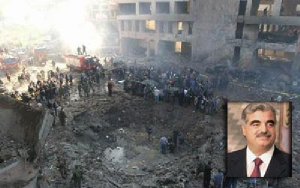 By ELIAS MUHANNA
By ELIAS MUHANNA
Beirut – “What a joke,” I heard someone snort at a nearby table. “As if Lebanon were truly independent…”
My favorite café is not usually so crowded on a Tuesday morning, but it’s Independence Day in Lebanon, a fact greeted lately with more irony than patriotism. In a country with 18 officially recognized religious sects, Nov. 22 is but one of a slew of other public holidays and religious celebrations that dot the yearly calendar: Orthodox Armenian New Year, the Feast of St. Maron, Eid al-Fitr, Ashura, the Prophet Muhammad’s birthday, Christmas and Easter — the list goes on.
And then there’s the unofficial catalogue of political observances that recognizes darker dates in Lebanon’s history, like Feb. 14, 2005, which many Lebanese recall with the same vividness that Americans of a certain generation remember the Kennedy assassination.
I was half a world away on that day, interviewing to get into graduate school, when the call came. “They’ve killed Hariri,” I heard my mother say.
The explosion that shook Beirut that afternoon left a swimming pool-sized crater in the ground and a gaping void in Lebanon’s political arena. The assassination of Rafik Hariri, a billionaire and former prime minister, triggered a surge of popular anger and united the country in a sustained moment of shock and disbelief.
A family member who thought little of Hariri and his policies found himself in tears when he heard the news. Relatives who had never paid attention to politics were suddenly consumed by it. In the following weeks, hundreds of thousands would take to the streets, accusing Syria’s government – which had long controlled Lebanese politics – of committing the crime, and demanding the withdrawal of its troops, which had been stationed in Lebanon for decades.
Meanwhile, the United Nations at the behest of America and France started a major investigation, eventually establishing an international court to prosecute Hariri’s killers.
The U.N.’s action struck me at the time as a landmark event, even more extraordinary than the withdrawal of the Syrian Army. It augured a kind of epistemological rupture, not just a break with the recent political past. Suddenly, ordinary citizens had the right to know the names of their assassins and terrorizers, rather than speculating emptily about obscure conspiracies. For many Lebanese with no recollection of the country’s colonial past, these events felt like a renewed independence.
Six years later, after millions of dollars and thousands of man hours, the U.N. Special Tribunal for Lebanon is finally prepared to begin its proceedings.
There’s just one problem: the accused are nowhere to be found.
The four individuals indicted by the tribunal earlier this year are said to be members of Hezbollah, the Shiite political movement that holds a prominent position in the current government of Lebanon and has dismissed the court as an Israeli conspiracy. Since arrest warrants were issued, the Lebanese police have predictably failed to find the men, aware that any attempt to arrest them would lead to a major political crisis and a confrontation with Hezbollah.
It seems increasingly likely, then, that the U.N. prosecutors will resort to trying the men in absentia, the first such case at an international court since Nuremberg. However, even if the phantoms are proven guilty, many Lebanese will be left wondering whether the mountains of investigative work amounted to a molehill of a conviction. As a veteran Lebanese journalist put it to me recently, “The public belief that the tribunal will uncover all or even most aspects of the crime has been lost.”
This pessimistic mood stands in contrast to the high-spirited early days of the investigation, when four Lebanese Army generals were taken into custody and European forensics experts combed the crime scene and interrogated the intelligence chiefs. Witnesses came forward with evidence of collusion by senior figures in the Syrian government. The era of unsolved political crimes seemed to be drawing to a close.
As time passed, however, the picture became cloudier. The generals were released due to lack of evidence. The star witnesses recanted their stories. The investigating commission began leaking like a sieve. Meanwhile, many Lebanese began to regard the tribunal as a gimmick.
Could it have been any different? Was the tribunal doomed from the start to fall victim to the forces of foreign intervention and local demagoguery? And was there ever a true opportunity for Lebanon to emerge stronger from the Hariri debacle, or did the crime simply exemplify the country’s fatal flaws?
Whatever the case may be, there can be no doubt that the tribunal’s significance has been steadily diminished, and that Feb. 14, the date of Hariri’s murder, has become just another partisan commemoration, like most of Lebanon’s other unofficial holidays. As for Nov. 22, who can blame the Lebanese for being cynical on their Independence Day?
Elias Muhanna is a visiting fellow at Stanford University’s Program on Arab Reform & Democracy. He writes about Lebanese political affairs on the blog Qifa Nabki.

Leave a Reply
You must be logged in to post a comment.